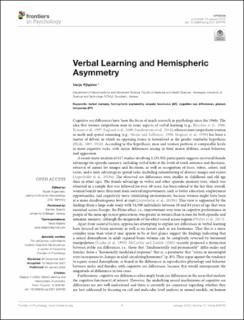| dc.description.abstract | Cognitive sex differences have been the focus of much research in psychology since the 1960s. The idea that women outperform men in some aspects of verbal learning (e.g., Bleecker et al., 1988; Kramer et al., 1997; Ragland et al., 2000; Sundermann et al., 2016), whereas men outperform women in math and spatial reasoning (e.g., Meinz and Salthouse, 1998; Maguire et al., 1999) has been a matter of debate, in which an opposing stance is formulated as the gender similarity hypothesis (Hyde, 2005, 2016). According to this hypothesis, men and women perform at comparable levels in most cognitive tasks, with major differences arising in their motor abilities, sexual behavior, and aggression.
A recent meta-analysis of 617 studies involving 1,233,921 participants suggests an overall female advantage for episodic memory, including verbal tasks at the levels of word, sentence and discourse, retrieval of names for images and locations, as well as recognition of faces, odors, colors, and tastes, and a male advantage in spatial tasks, including remembering of abstract images and routes (Asperholm et al., 2019a). The observed sex differences were smaller in childhood and old age than in other ages. The female advantage in verbal and other episodic memory tests, which was observed in a sample that was followed for over 40 years, has been related to the fact that, overall, women benefit more than men from societal improvements, such as better education, employment opportunities, and cognitively more stimulating environments, because women might have been at a more disadvantageous level at start (Asperholm et al., 2019b). This view is supported by the findings from a large scale study with 34,300 individuals between 50 and 84 years of age that were recruited across Europe: the Flynn effect, i.e., improvement over time in cognitive performance in people of the same age in new generations, was greater in women than in men for both episodic and semantic memory, although the magnitude of the effect varied across regions (Weber et al., 2017). | en_US |

